A baby passing out while crying, can this really be normal..?
Read a mom’s question here, what’s happening, and how to address the situation.
Mom’s Question:
My son is 13 months old, and since he started walking three months ago, he, of course, has been clumsy and tripping and falling. But when he hits his head, he cries; I run to pick him up, and he stops crying and breathing for a few seconds. Before you know it, he gets all stiff and blacks out for a few seconds. The whole time, I’m blowing air in his face (hard), kind of patting his back, and telling him he’s okay. When he finally opens his little eyes, he takes a deep breath, cries for a few seconds, then looks tired and acts mellow.
I’ve asked his pediatrician about it the last three times I’ve taken him in for check-ups. He says it’s just him freaking out from the fall, and he passes out because of a lack of oxygen to the brain, not from the hit itself. I have three kids; this only happened to my 4-year-old once. I took him to the ER, and they told me the exact same thing. But my baby does this, I’d say, about once every couple of weeks.
I try to be around him all the time to avoid accidents, but it’s hard to keep up…
What is this, and what should l do? I am really worried.
Yessenia
Baby Passing While Crying: Reasons, Prevention, and How to Handle the Situation
A baby that passes out while crying is not uncommon, and I think the advice from your pediatrician is correct. Your son may have something called breath-holding spells. Many young children experience them, they are not dangerous, and children grow out of them at around 5 years of age.
I have asked one of the pediatricians, Leah M. Alexander, in our medical reference team to provide you with a thorough guide to breath-holding spells and other possible reasons why an upset or crying baby or young child may be passing out and how to manage the situation:
In this article:
- Breath-Holding Spells
- What Causes Breath-Holding Spells?
- What Exactly Occurs During a Breath-Holding Spell?
- Do Breath-Holding Spells Cause Brain Injury?
- If Not a Breath-Holding Spell, Then What Is It?
- Can Breath-Holding Spells Be Prevented?
- What To Do During A Breath-Holding Spell
- When To Call A Doctor
Breath-Holding Spells
The episodes described above are called breath-holding spells. Despite their alarming appearance, they are neither harmful nor a sign of a medical problem. Up to 5 percent of healthy infants and children have breath-holding spells. They may begin as early as six months old and continue until age six. Breath-holding spells can be triggered by anything that upsets or frightens the child. It may be something as innocuous as a slight bump on the head or a fall while running. Temper tantrums are also a common trigger.
What Causes Breath-Holding Spells?
Although the exact cause is unknown, there is often a family history of breath-holding spells.
They occur more frequently in children with iron deficiency anemia, especially under age two.
Recent studies have hypothesized that there may be an imbalance in the activity of the parasympathetic (relaxation) and sympathetic (fight or flight) nervous systems.
What Exactly Occurs During a Breath-Holding Spell?
Breath-holding spells are reflex reactions. They do not occur “on purpose.”
They begin with the child crying in response to an upsetting or frightening occurrence, followed by silence as the child holds their breath. The color of the child’s face then changes, followed by a brief loss of consciousness. Once consciousness is lost, breathing resumes, normal skin color returns, and the child is responsive again. The whole episode lasts no more than one to two minutes.
Two types of breath-holding spells have been described:
Cyanotic Breath-Holding Spells
During cyanotic breath-holding spells, the child’s face turns a bluish (cyanotic) color. They are the most common type and are usually triggered by a temper tantrum. Afterward, the child may seem tired.
Pallid Breath-Holding Spells
Experiencing fear or pain triggers this type of breath-holding spell. Instead of becoming cyanotic, the skin looks pale because the child’s heart rate slows down while the breath is held. The body may exhibit brief seizure-like jerking movements or incontinence during the episode, followed by fatigue once consciousness returns.
Do Breath-Holding Spells Cause Brain Injury?
During a breath-holding spell, there is a brief period of time during which less oxygen is transported to the brain. Fortunately, these brief spells do not cause any damage to brain tissue. No changes have been noted on MRI scans, and levels of brain metabolites remain normal.
If Not a Breath-Holding Spell, Then What Is It?
It is important to distinguish breath-holding spells from other conditions that may mimic some of the symptoms. These include periodic breathing, seizures, cyanotic heart disease, and shuddering attacks.
Periodic Breathing
Periodic breathing is a phenomenon seen in both full-term and premature infants. It is a variation of breathing patterns that occurs only during sleep. The infant has alternating phases of rapid breathing, pauses, and normal breathing rates. Periodic breathing is considered normal and has no adverse effects on the body or brain. There is no crying or skin color change, and it does not occur while a baby is awake.
Seizures
Concern for a possible seizure disorder is the most common reason for a child with breath-holding spells to be referred to a neurologist.
Seizures are the sudden onset of abnormal movements or behaviors that can occur with or without a loss of consciousness. They are caused by either a fever among children under the age of five or a brain abnormality. Seizures can involve jerking movements of the whole body or only one body part, staring spells, or body stiffening. Unlike breath-holding spells, seizures are not triggered by upsetting, painful, or frightening events. They occur at random, unexpected times and can last longer than a breath-holding spell.
Depending on the severity of the seizure disorder, a child may have developmental delays and cognitive impairment.
Cyanotic Heart Disease
When an infant is born with a malformed heart, the blood flows through it in an abnormal way. Blood that has picked up oxygen from the lungs mixes with low-oxygen blood from the body, causing the skin to periodically have a bluish hue. During feedings, vigorous activity, or stressful situations (i.e., illness, straining to pass stool), hyper cyanotic spells may occur.
These are episodes of intense crying with increasing cyanosis despite a rapid breathing rate. If allowed to continue, consciousness may be lost, which could lead to death. Hypercyanotic spells are most common under the age of six months but are possible in older children. Surgical correction of the heart condition is usually required.
Shuddering Attacks
Shuddering attacks occur in infants and toddlers under age two and may be triggered by feelings of excitement or frustration. They are characterized by a sudden stiffening of the body, followed by shivering, which lasts up to 15 seconds. There is no loss of consciousness.
Shuddering attacks self-resolve and are not associated with long-term neurological problems.
Can Breath-Holding Spells Be Prevented?
It can be difficult to prevent an infant or child from becoming so upset that it triggers a breath-holding spell. For example, once a toddler is fully engaged in a tantrum, they may not have the self-regulation skills to control it before a breath-holding spell begins. Conflicts that arise during mealtime and daily activities should be managed in a calm manner to reduce the likelihood of a tantrum. Trying to calm a baby or child at the onset of crying may prevent a breath-holding spell.
Remaining calm or making light of mild bumps and falls may help, in a sense, leading by example. As parents, we want to protect our children and stop them from getting hurt. When something does happen, like a fall, we tend to rush over in a panic, fearful that our child is badly hurt. We make a big fuss, and unfortunately, our anxiety and fear are transmitted to our babies, increasing their fear and shock.
Falling over and bumping heads is part of growing up and learning to take risks. Babies need to be able to explore and challenge their bodies to learn new skills. They sometimes get a fright when they lose control and fall, but we can make it worse with our reaction. By making a big event out of it, we can actually reinforce whatever strong reaction they have.
So the next time he falls, see if you can back off a bit and make it more light-hearted. “Woopsie” or “Up you hop” – or wait a few seconds and check first: Do you need a cuddle? Just try to trust that he is learning to control his world, and yes, there will be a few bumps and bruises on the way, but you offer him so much more when you keep control of your panic reaction and empower him to keep trying.
However, if all attempts fail and the breath-holding spell does occur, parents should be reassured that it causes no harm to the child. So, again, no reason to panic.
There are no specific tests or imaging studies for breath-holding spells, although they may be used to rule out other possible diagnoses. If your child has iron deficiency anemia, iron supplementation may decrease the frequency of the breath-holding spells. Anti-seizure and other medications, however, are ineffective and not recommended.
What To Do During A Breath-Holding Spell
The most important thing is to prevent injury to your child during the breath-holding spell. It may be safer to lie the child down on a flat surface such as a crib, bed, or floor until the episode is over. Make sure that there are no objects nearby that could fall on the child and cause injury.
When To Call A Doctor
If a breath-holding spell does not follow the usual sequence of symptoms, this warrants a call to a doctor. Other symptoms could indicate a medical problem. These include:
- No inciting trigger prior to the episode
- The breath-holding spell lasts longer than two minutes
- Prolonged loss of consciousness
- Prolonged cyanosis or pallor
- Fever or other signs of illness
Takeaway
Breath-holding spells may seem scary but are not dangerous. They are common in young children. However, if you suspect that what your baby is experiencing is not a breath-holding spell, but something else, you should take them to a doctor for a diagnosis.
As parents, it is important to try to prevent breath-holding spells by helping our babies and toddlers avoid tantrums. Sometimes this won’t help, though, and in such cases, we need to make sure our children are safe during the episode.
Your little boy is clearly very tuned into your emotions, so focus on having fun and enjoying him rather than worrying or feeling anxious. If you try to stay calm, you may help prevent these episodes from occurring quite as often. When they do occur, just stay calm. Read more among the links below about parents who have experienced similar situations.
I hope this helps,
Paula
Read Next: More Children That Pass Out
References
- Leung AKC, Leung AAM, Wong AHC, Hon KL. Breath-Holding Spells in Pediatrics: A Narrative Review of the Current Evidence. Curr Pediatr Rev. 2019;15(1):22-29. doi: 10.2174/1573396314666181113094047. PMID: 30421679; PMCID: PMC6696822.
- Calik M, Sen Dokumaci D, Sarikaya S, Demir M, Isik I, Kazanasmaz H, Kaya C, Kandemir H. Brain metabolite values in children with breath-holding spells. Neuropsychiatr Dis Treat. 2017;13:1655-1660 https://doi.org/10.2147/NDT.S135842
- Flodine TE, Mendez MD. Breath Holding Spells. [Updated 2023 Jan 31]. In: StatPearls [Internet]. Treasure Island (FL): StatPearls Publishing
- Alicia K. Yee, Leon S. Siriwardhana, Gillian M. Nixon, Lisa M. Walter, Flora Y. Wong, Rosemary S.C. Horne, Duration and Consequences of Periodic Breathing in Infants Born Preterm Before and After Hospital Discharge, The Journal of Pediatrics, Volume 255, 2023, Pages 112-120.e3, ISSN 0022-3476, https://doi.org/10.1016/j.jpeds.2022.10.035.
- Sawires R, Buttery J, Fahey M. A Review of Febrile Seizures: Recent Advances in Understanding of Febrile Seizure Pathophysiology and Commonly Implicated Viral Triggers. Front Pediatr. 2022 Jan 13;9:801321. doi: 10.3389/fped.2021.801321. PMID: 35096712; PMCID: PMC8793886.
- Wang JJ, Goldman RD. Shuddering attacks: A benign phenomenon in children. Can Fam Physician. 2021 Feb;67(2):107-108. doi: 10.46747/cfp.6702107. PMID: 33608360; PMCID: PMC8324121.
- Perth Children’s Hospital (PCH) is in Western Australia, Hypercyanotic spells
Find comments below.

Paula Dennholt founded Easy Baby Life in 2006 and has been a passionate parenting and pregnancy writer since then. Her parenting approach and writing are based on studies in cognitive-behavioral models and therapy for children and her experience as a mother and stepmother. Life as a parent has convinced her of how crucial it is to put relationships before rules. She strongly believes in positive parenting and a science-based approach.
Paula cooperates with a team of pediatricians who assist in reviewing and writing articles.


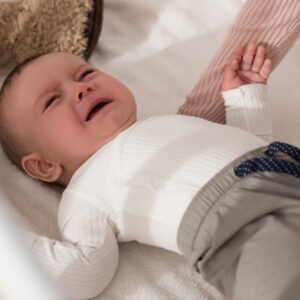
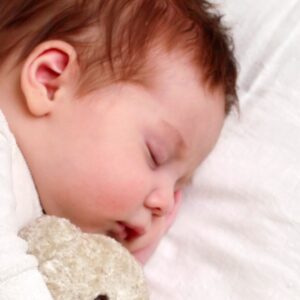

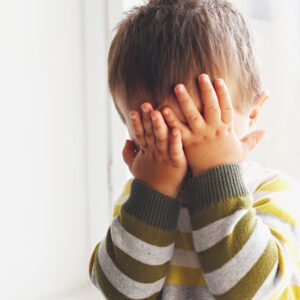
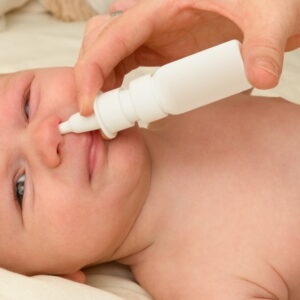
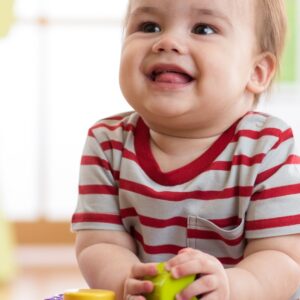
Wooo I was so worried befor reading all of these comments because my 20 month old baby does the same thing ..the 1st time it happend he was like 9 months and I was super scared and it has happend like 3 times after that and its really really starting to scare me…I didn’t think it was so common..I told my friend about it and she said it could be some kind of seizue so that freaked me out even way more…should I take him to the E.R since his docter doesnt do anything about it….could it be harmful to his brain?
I’m so relieved to read this..my 14 month old son fell this morning..I didn’t see where he himself but I’m sure it was his head..I ran to him and he was just lying there looking like he was about to cry he let a cry out I picked him up and he went completely limp and closed his eyes..I lost it! Screamed at him to wake up and he started flickering his eyes two seconds later..I called ambulance becAuse I was freaked out and like story above by time paramedics left he was running around happy as..I was shaken for hours afterwards!
My son does the same thing & it started as soon as he turned one. He’s had an EEG and an EKG done, and the results returned fine. They gave him some iron supplements cause they said he had low iron & that that would prevent the fainting. It happened again yesterday. I want answers :-(
We were at a party yesterday when the kids were playing on the slippery water slide on the ground and my daughter ran and jumped on that slippery mat and fell very hard on her back and head and I think more so she felt embarrassed by the other kids, that she went into a deep cry and couldn’t come out then she turned blue in her face and collapsed on me, my dad took her and somehow she came back to herself but couldn’t stop crying, my heart was finished for her.
It is one experience I don’t ever want to go through; it is very scary to see that happening; I didn’t know what to do or how to help. I just thank God she is her normal self……
Wow, reading that was like reliving last night with my daughter. She just turned one and has done this twice now. The first time I hysterically called 911 by the time they arrived, she was running around as nothing had ever happened. Her doctor said the same thing, that she just works herself up. My mother said I did it when I was little, and my grandmother said my father did it when he was little. It is still is very scary, and I will still call the doctor every time it happens. Good luck to you!
The same thing has been happening to my 9-month-old… When I post online, other moms say she is holding her breath, but she is not!!! After she bonks her head, she isn’t even crying for more than a second before she goes unconscious. The ER doctors say its tiny seizures but her pediatrician thinks she is passing out as a response and her bodies way of responding. I have read everything I can find on concussions and seizures, and neither one is exactly what is going on with her!!! Just waiting to see get an EEG and find out what is happening to my poor baby!!!
Hello, moms out there! I’m 28 years old, and this happened to me when I was a baby, until I was 6 or 7 years old. IT IS NOT a thing you do to call the attention of the parents; as the person who suffered from it for so many years as a child, I can say that is awful not be able to cry without running out of oxygen. I still remember the times when it would happen, and I felt like I was going to die; my parents would freak out and start pounding on my feet and back, one time it was so bad I wouldn’t come back and they had to pour water on me to make me come back.I don’t want to scare anybody! As this seems to happen to small kids and they can’t really communicate with you that well, I thought I would tell my story since I never knew why this would happen to me. Don’t worry… Your child will grow out of it! Much Luck!
my 9-month-old baby does the same thing, at first she hit her head and did it which was really scary, she has done it a couple more times while mildly hurting herself ie fall or bumping, but recently I took a toy off her and she did it out of anger or frustration, I have tried to read a lot on the net about it but can’t find anything about how to prevent it from happening. This post by Paula was really good and makes a lot of sense to me. if anyone knows more about how to stop this from happening, let me know, please
My daughter does this too. She is almost three and it has only happened three times in her life, but it really freaks me out. This is my fourth child and has never happened with any of my other children. She hit her head tonight on the bathroom floor, started crying really hard and did not inhale. Then her eyes rolled back in her head while I held her and she went limp. As she went unconscious, she still wasn’t breathing and didn’t for about five seconds. Then she awoke for about two seconds, and the same thing happened again. By that time, I was screaming at her and she finally opened her eyes and seemed fine, other than being upset that I was screaming at her to wake up. She immediately asked for Rice Krispies. She acted perfectly fine after that and ate all her cereal. Weird!!
My son is now 2 and has been doing this since he was 4 months old. He does it at least once a week. He is always fine but just gets very upset when he gets upset. It could be because he falls or because I didn’t give him an m&m. It is very scary to see and witness, and I do not think that gets better. No matter how many times they do it. I just try to change the environment and talk to him (usually going outside).
He will pass out, and them reflexes take over, and he catches his breath.I wouldn’t worry unless when he does it, he starts to shake…then you may be looking at a seizure.
Good luck, and remember they are just little people, and it is so hard for them to communicate.
:)
I’m so relieved to read all the other comments because my 9 months old just fell and went out of breath, all blue in the face until it looked like a type of unconscious state where his eyes were not straight…then all of a sudden, he was fine again! I completely freaked out & am so glad to hear it’s common….
I also have a 16-month-old son who has been doing this exact same thing. Falling down, bumping his head, and crying until he passes out. I am glad to see it is not uncommon. I have been very freaked out.
Everything that you are saying is the exact same thing that my daughter does… Except one night she was running a fever, and she was sleeping, and all of a sudden, she screamed, so my husband grabbed her; she was having a seizure, so we rushed her to the hospital, and he said it wasn’t anything thing major, but I explained the whole passing out thing. He says that’s not her passing, that’s she having a seizure so now I don’t know what to think… Because I had one doctor tell me it was her holding her breath, another tells me to get her checked, and the er doc told me she has been having seizures this whole time… So what do I do!!!!!
Hi,
When a child has a temperature and passes out that is completely different from the breath-holding spells, and you are right, it is dangerous. That is one of the reasons it is really important to get a child’s temperature down when they are running a fever.
It is always better to check with your doctor if you are worried your child may be unwell. Never rely on internet information – ours included!
My daughter just did that for the first time, but it was not after a fall. My neighbor was leaving, and she got upset (she loves our neighbor). She was crying in my arms and cried out and would not breathe back in. I tried to blow in her face, but she went limp. When I laid her on the ground, she started breathing and crying again.
I have known for a while that this is not uncommon. I was once told by a Pediatric Neurologist that it is actually partly developmental. He said that a trigger mechanism in the brain makes them breathe back in when they are crying. Sometimes, this mechanism fails with some children, and they don’t breathe in. He said it was ok, and they grow out of it.
I was always worried that my son would do this because he would cry out until his face was bright red but never passed out. My daughter is the same way and guesses this time; she just did it a little too long.
I know it is very upsetting to any parent, and it was for me, even though I knew it was ok.
My little girl does exactly the same. It’s every time she falls backward; she is two now, and it has been happening since she was one. It’s happened at home in the playground at school!! It’s the most terrifying thing ever to feel your baby go limp and lifeless when you go to pick them up. I wish someone could give some more in-depth answers. I also have a little older boy who has never done this.